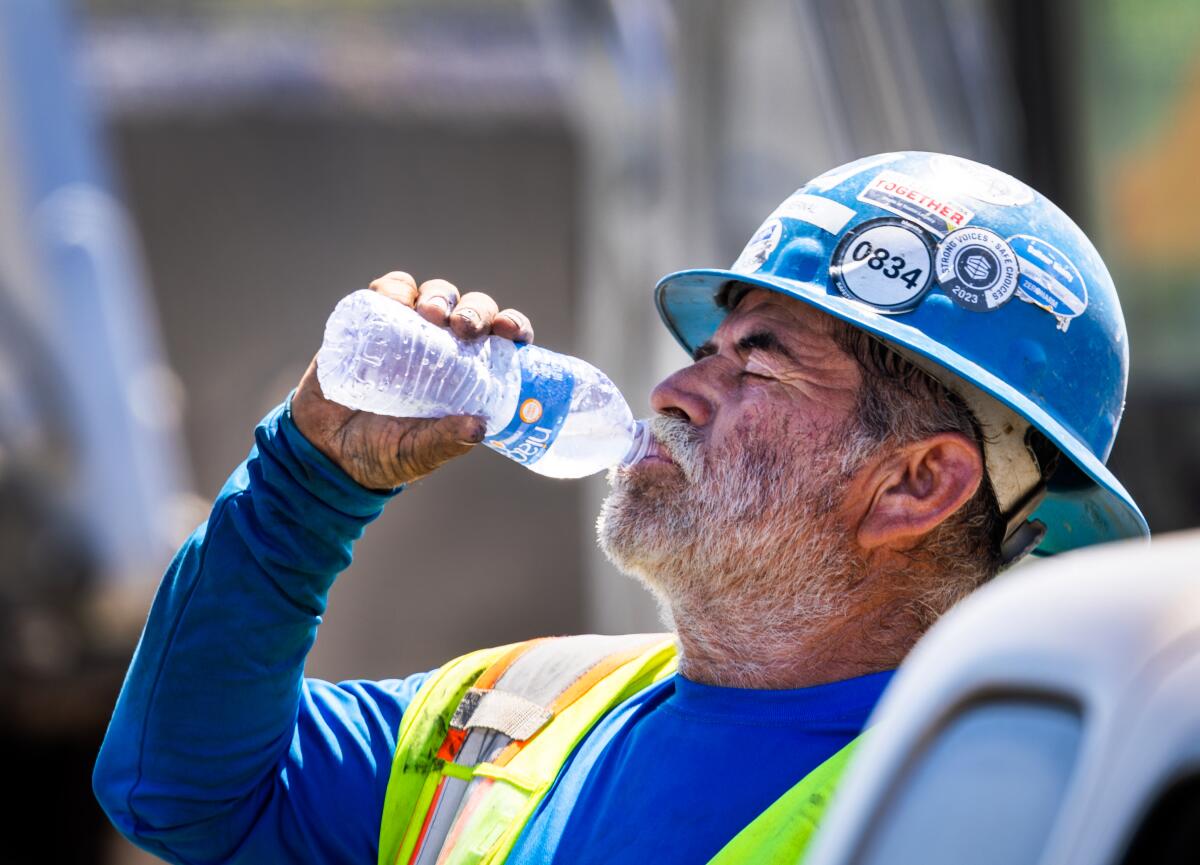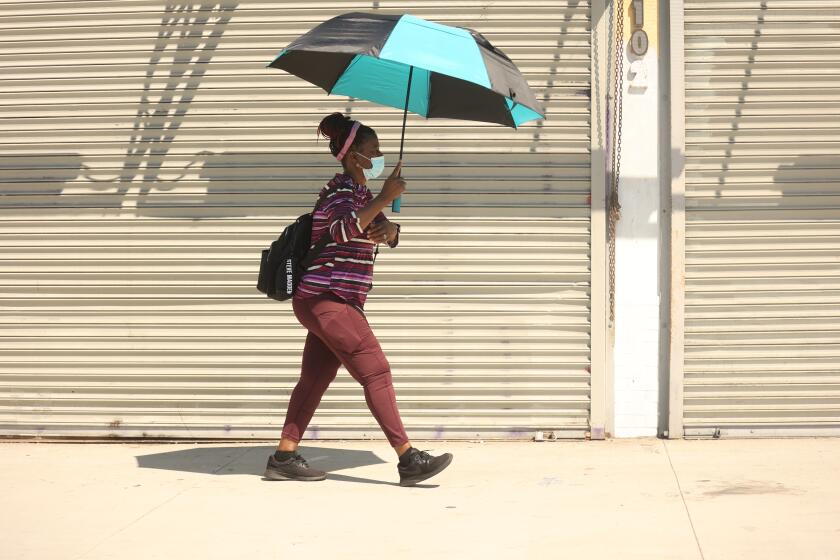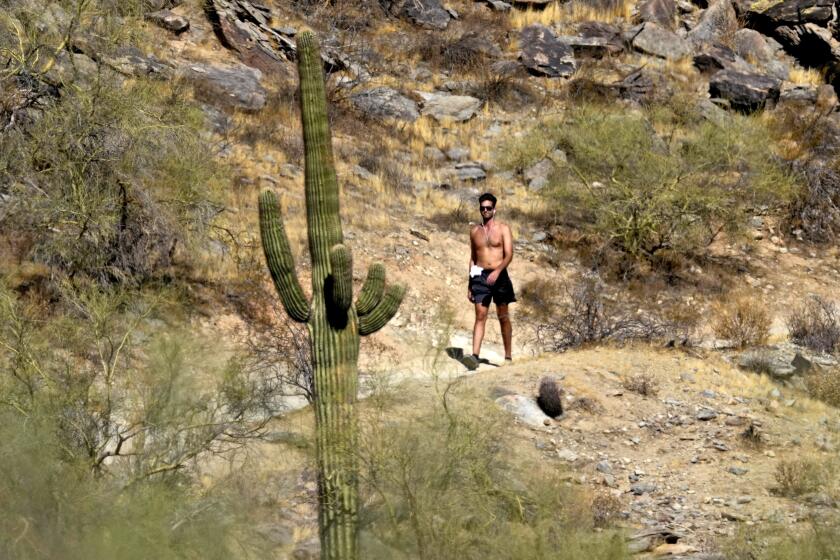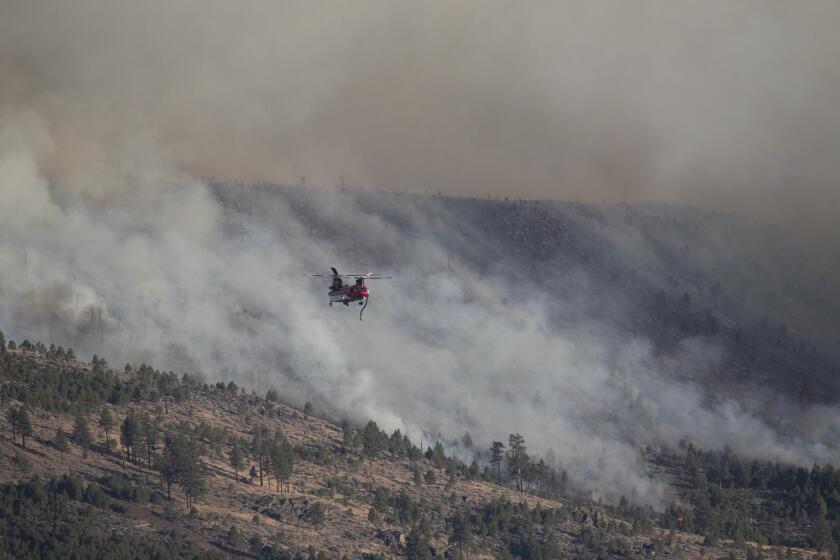Southern California broils under punishing heat wave. When will it end?

- Share via
The oppressive heat wave broiling Southern California and the Southwestern U.S. is expected to bring triple-digit temperatures to much of the region for at least the next few days.
It reached 101 degrees in downtown Los Angeles Thursday afternoon — the first time the local temperature has reached triple digits in two years — and is expected to stay in the low 100s on Friday, according to Joe Sirard, a National Weather Service meteorologist in Oxnard.
In the western San Fernando Valley, temperatures had already reached 115 degrees on Thursday and were expected to be between 110 and 118 degrees on Friday, he said. The San Gabriel Valley will see temperatures as high as 106 on Thursday and 109 on Friday.
“It’s a widespread, dangerous heat event,” Sirard said. “It’s significant in terms of how hot it’s going to be and the duration. We have overnight lows that will be very, very warm to even hot, so we’re looking at the foothill areas remaining over 90 degrees.”
Meteorologists say temperatures could reach 115 degrees in the San Fernando Valley. Burbank, Woodland Hills and Palm Springs could also see triple digits.
It’ll be cooler — but still toasty — along the coast, with thermometers peaking in the upper 70s at the beaches and in the low 90s a few miles inland, Sirard said. On Friday, it’ll be around 100 degrees in Long Beach and 80 degrees at the coast.
Southern Californians shouldn’t expect a major reprieve until Tuesday, as high temperatures will only tick down 2 to 3 degrees over the weekend. Valleys will see temperatures of up to 112 on Monday, with triple-digit temps also forecast in inland areas closer to the coast.
Temperatures are expected to drop Tuesday and Wednesday, reaching levels closer to normal in most areas.
Heat waves aren’t unusual in September — this month is the warmest of the year for some parts of L.A. But this latest event is still remarkable for its intensity.
“We wouldn’t necessarily get this extreme heat in September, but it can happen,” Sirard said.
A broiling heat wave is expected to bring triple-digits to Southern California and much of the Southwest this week, coming on the heels of what experts say has been the hottest summer on record for most of the region.
The National Weather Service has issued an excessive heat warning for much of the Los Angeles area — including the inland coastal plain all the way to the Santa Monica Mountains — until 8 p.m. Saturday, with “dangerously hot conditions” and temperatures between 95 and 110 degrees expected.
There is a higher risk for heat-related illness for the elderly, young and those spending time outdoors and without air conditioning. People should drink plenty of fluids, stay in an air-conditioned room, stay out of the sun and check on their neighbors and relatives.
Young children and pets should never be left in unattended vehicles, officials warn, as temperatures inside cars could reach deadly levels within minutes.
A red flag warning, which means the National Weather Service has high confidence that dangerous fire weather conditions will materialize, is in effect for southern and mountainous portions of Santa Barbara County through Saturday. People should avoid using anything that could spark a fire and be prepared to evacuate if they live in high-risk areas.
High winds, dry brush, and steep terrain have made the Bear fire in Sierra County a challenge to fight since it was sparked Monday. Officials said the flames are within a mile of a Sierra Nevada community.
Sirard cautioned against hiking during the extreme heat, and said the Santa Monica Mountains are particularly dangerous in this weather.
“The higher you go in the mountains and foothills, it’s actually just going to be just as hot if not hotter than the lower areas,” he said.
More to Read
Sign up for Essential California
The most important California stories and recommendations in your inbox every morning.
You may occasionally receive promotional content from the Los Angeles Times.

















